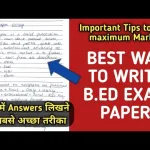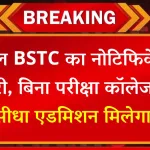The STET (State Teacher Eligibility Test) Bihar syllabus is a key component for those aspiring to become teachers in Bihar. It helps candidates understand what topics and subjects will be covered in the exam. The syllabus is structured to assess the candidate’s knowledge, teaching aptitude, and understanding of key concepts relevant to the subject they wish to teach. The exam is divided into multiple sections, each focusing on specific areas that are essential for the role of a teacher. The syllabus is designed to ensure that only the most qualified candidates are selected to teach in schools across the state of Bihar.
Breakdown of the STET Bihar Syllabus 2025
Unit 1: Child Development and Pedagogy
-
Key Topics:
-
Principles of Child Development
-
Cognitive and Emotional Development
-
Learning Theories (Piaget, Vygotsky)
-
Educational Psychology
-
Role of Teacher in Child Development
-
-
Explanation: This section helps you understand the psychological aspects of learning. You’ll explore how children grow and learn, and how teaching methods can be tailored to suit different developmental stages. It also covers classroom management and teaching strategies that promote effective learning.
Unit 2: Language I (Hindi/English)
-
Key Topics:
-
Language Skills (Reading, Writing, Speaking, Listening)
-
Grammar and Syntax
-
Literature and Poetry
-
Pedagogical Approaches for Language Teaching
-
-
Explanation: In this section, you will focus on the core language skills, with an emphasis on Hindi or English, depending on your specialization. You’ll learn about language acquisition theories, teaching strategies, and the literature that students are expected to study. This section is important for candidates teaching languages at various levels.
Unit 3: Language II (Hindi/English/Other)
-
Key Topics:
-
Bilingual Education and its Techniques
-
Classroom Activities for Language Teaching
-
Cultural and Contextual Relevance in Language Teaching
-
-
Explanation: This unit expands on Language I, offering a second language for teaching. You’ll explore different methodologies for bilingual education and how to teach another language effectively, which is essential in a multilingual classroom environment.
Unit 4: Mathematics (For Math Teachers)
-
Key Topics:
-
Arithmetic and Number Theory
-
Geometry and Measurement
-
Algebra and Calculus
-
Pedagogy of Mathematics
-
-
Explanation: This section focuses on the essential mathematical concepts that every teacher needs to understand and teach effectively. From basic arithmetic to more advanced concepts, you’ll gain a comprehensive understanding of how to teach math across different grade levels.
Unit 5: Science (For Science Teachers)
-
Key Topics:
-
Physics, Chemistry, and Biology Concepts
-
Practical and Experimental Science
-
Environmental Science
-
Science Teaching Pedagogy
-
-
Explanation: Here, you’ll dive into the scientific principles required for teaching science. You’ll learn how to incorporate practical and theoretical aspects of science in the classroom. The aim is to develop critical thinking and problem-solving skills in students.
Unit 6: Social Studies (For Social Science Teachers)
-
Key Topics:
-
History, Geography, Civics, and Economics
-
Understanding of Historical Events
-
Geography: Maps, Resources, and Physical Features
-
Social Studies Pedagogy
-
-
Explanation: This unit focuses on social studies, which includes history, geography, civics, and economics. You’ll develop strategies to make these subjects interesting and accessible to students while emphasizing critical thinking and understanding of the world around them.
Unit 7: General Knowledge & Current Affairs
-
Key Topics:
-
National and International News
-
Indian Politics, Economy, and History
-
Environmental and Social Issues
-
-
Explanation: This unit assesses your general awareness of current events and broad knowledge about the world. Being well-versed in current affairs and general knowledge is crucial for teaching various subjects and for participating in discussions that enhance student engagement.
Examination Pattern
The STET Bihar exam typically includes the following:
-
Type of Questions: Multiple Choice Questions (MCQs) and descriptive questions.
-
Marks Distribution: The total marks are generally divided across different sections, each with a specific weightage.
-
Time Duration: The exam usually lasts around 2 to 3 hours, depending on the number of sections.
-
Negative Marking: Some exams may include a negative marking system, where marks are deducted for incorrect answers.
Recommended Study Materials and Resources
-
Books:
-
“Bihar STET Teacher Eligibility Test” by Arihant Publishers
-
“Objective General Knowledge” by R.S. Aggarwal
-
“Pedagogy of Language Development” by R.C. Sharma
-
-
Online Resources:
-
Websites like Examrace, Gradeup, and Testbook offer mock tests, previous years’ question papers, and syllabus breakdowns.
-
-
Study Plan Tips:
-
Allocate time to each section based on your strengths and weaknesses.
-
Focus on one unit at a time to avoid feeling overwhelmed.
-
Regularly take mock tests to evaluate your progress.
-
Frequently Asked Questions (FAQ) for STET Bihar Syllabus
1. What is the eligibility for STET Bihar exam?
To be eligible for STET Bihar, candidates must have completed their graduation along with the required educational qualifications in the relevant teaching subjects. A Bachelor of Education (B.Ed.) is typically required for certain teaching positions.
2. How many times can I appear for the STET Bihar exam?
Candidates can appear for the STET Bihar exam multiple times. There is no limit to the number of attempts as long as you meet the eligibility criteria.
3. What is the marking scheme for the STET Bihar exam?
The exam consists of multiple-choice questions, and each question carries one mark. There is usually negative marking for incorrect answers, where a fraction of the marks is deducted.
4. Can I get the syllabus in Hindi?
Yes, the STET Bihar syllabus is available in both English and Hindi for candidates who prefer to study in the Hindi language.
5. How should I prepare for the STET Bihar exam?
It is advisable to start early by thoroughly studying each section of the syllabus. Use standard textbooks, online resources, and practice tests. Staying consistent with your preparation and revising regularly is key to succeeding in the exam.
Latest Posts
- Step-by-step guide to download and apply for jee mains admit card 202
- Comprehensive 2025 government holidays and recruitment details for job seekers
- JEE Mains Admit Card 2025: Your Step-by-Step Guide to Downloading the Hall Ticket
- Everything You Need to Know About 2025 Government Holidays Recruitment
- Comprehensive Guide to rrb d group recruitment 2025 – Eligibility, Vacancies, and Application
- Detailed guide to nps trust recruitment 2025 vacancies, eligibility and apply process
- Comprehensive guide to hpcl recruitment 2025 notification, vacancies, and application process
- ignou bed admission 2025 complete recruitment guide with eligibility and process
- Comprehensive Guide to Indian Army Agniveer Recruitment 2025 Notification and Jobs
- Everything You Must Know About CBSE Board Exams 2025 Changes & New Rules



